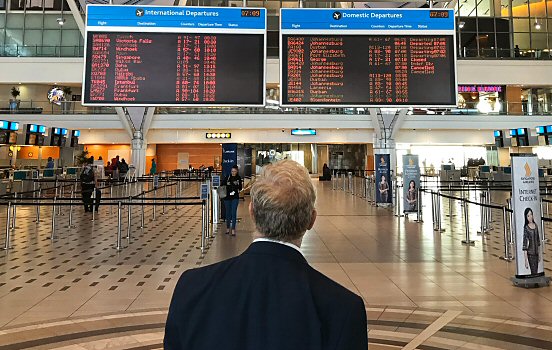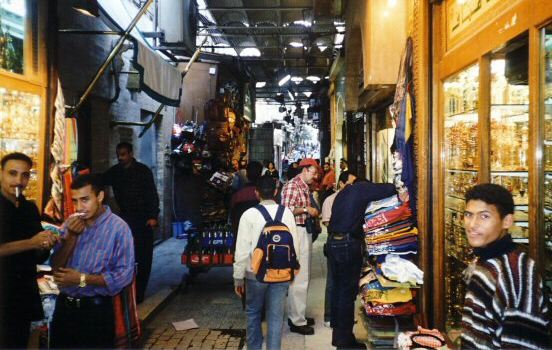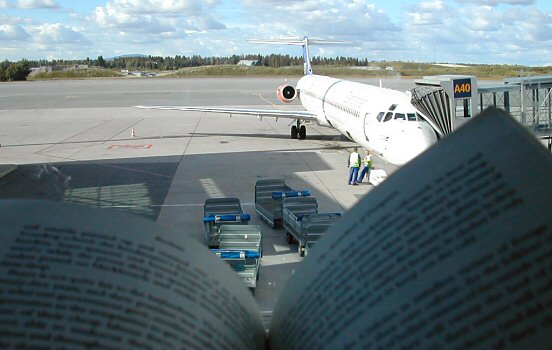I’m currently sitting in a train traveling northeast. It is a Sunday evening in November, the month when this part of the world is covered by a cold blanket of gloom. I lift my eyes and have a look at my fellow passengers.
People are traveling around the globe more than ever before. A lot of it can be derived to improved economies, increased living standards and the global information society. But all that is just providing a way to travel. The interesting question is why we choose to travel?
In fact, those hard-earned money could very well be spent on far better things than traveling. All that money could feed hundreds of people instead of going into the pockets of international airlines and questionable hotel chains.
 Anywhere but here.
Anywhere but here.
I suppose a fair bit of traveling can be attributed to a kind of rewarding luxury after spending a year at work, equal to buying stuff you desire but don’t really need. The availability of the information society is placing quite a weight on people’s shoulders. The onslaught of news channels and online mediums combine with the unyielding cell phones to make your brain constantly work in high gear.
The important recreation phase of the day shrinks more and more. A temporary relief could be to move in a different direction for a while.
However, I think there is something more to travel. For me, the main reason for traveling is to better understand other cultures and learn more about the world. Who knows, I might also learn something about myself in the process.
Meet the locals with open eyes. Be an objective observer instead of hastily judging others. Encourage your brain to create new neural pathways. Step out of your comfort zone.
Do ask the locals for advice, but choose wisely. I guarantee that the young clerk at the hostel has a lot better knowledge of cool things to do and exciting stuff to eat in the town than the well-dressed receptionist at the upscale hotel. Unless you’re actively looking for the polite safe-but-dull tips like “try the Oyster Bar in Grand Central Station” or “look for sea food at Fisherman’s Wharf”.
 Through the chaos of Khan el Khalili bazaar, Cairo.
Through the chaos of Khan el Khalili bazaar, Cairo.
The common wording “finding yourself” is a tired old cliché, but it may be quite accurate in the society of 2007. One of the most striking things about the modern man is the urge to move, both in terms of physical world and inner self. “Choose life, choose a job, choose a career” as Mark Renton put it in Trainspotting ten years ago.
Fear of the unknown is a feeling as old as mankind itself, and few things can match the uncertainly factor that traveling provides. As such it can be an easy argument for not traveling, but I like to think of it in reverse: Use your fear to travel. Push through the veil of uncertainly and discover that there is no monster hidden behind it. As one of my all-time favorite quotes put it:
“I must not fear. Fear is the mind-killer. Fear is the little-death that brings total obliteration. I will face my fear. I will permit it to pass over me and through me. And when it has gone past I will turn the inner eye to see its path. Where the fear has gone there will be nothing. Only I will remain.”
— Frank Herbert, Dune
The need for exploration is a strong calling for some people. When George Mallory was asked why he wanted to climb Mount Everest, he simply answered “Because it’s there”.
To many, it has become an obsession. Elliott Hester sold every possession and started to travel the world. In the epilogue of Adventures of a Continental Drifter, he considers for a second to stop traveling and settle for a normal life. He immediately recoils from the idea and makes a comparison to the movie Matrix. To settle down would be like staying in the Matrix forever, when the real world awaits undiscovered on the outside.
 Reading Chatwin while waiting at Gardemoen, Oslo.
Reading Chatwin while waiting at Gardemoen, Oslo.
Bruce Chatwin is another example. He often claimed that humans were essentially nomads, driven by curiosity and restlessness to discover new places. The normal state was supposed to be movement and Chatwin himself tried to embody the words of Rimbaud, “ĽHomme aux semelles de vent” (man with soles of wind). During his later years he got rid of many possessions he had earlier collected in a frenzy around the world and hunted for stories instead of objects.
I think the answer to the question is too complex to describe in a few words, and there are probably just as many answers as there are people in the world. Why do you travel?
2 comments
I’m with Chatwin – it is a necessity. However, I do believe it’s rather a matter of frame of mind; Where means are lacking, travel is still possible, if only in time and imagination. But where no travel exists, be it of any kind, apathy seems inevitable.
You’re absolutely right – travelling is possible without spatial movement and that is the important part.
Leave a reply